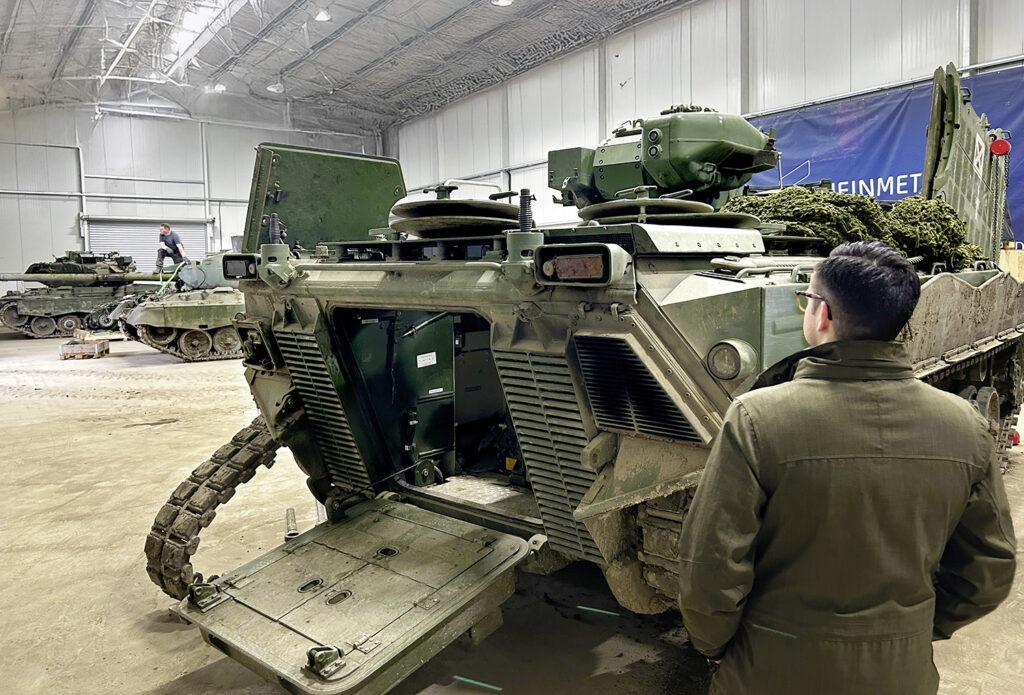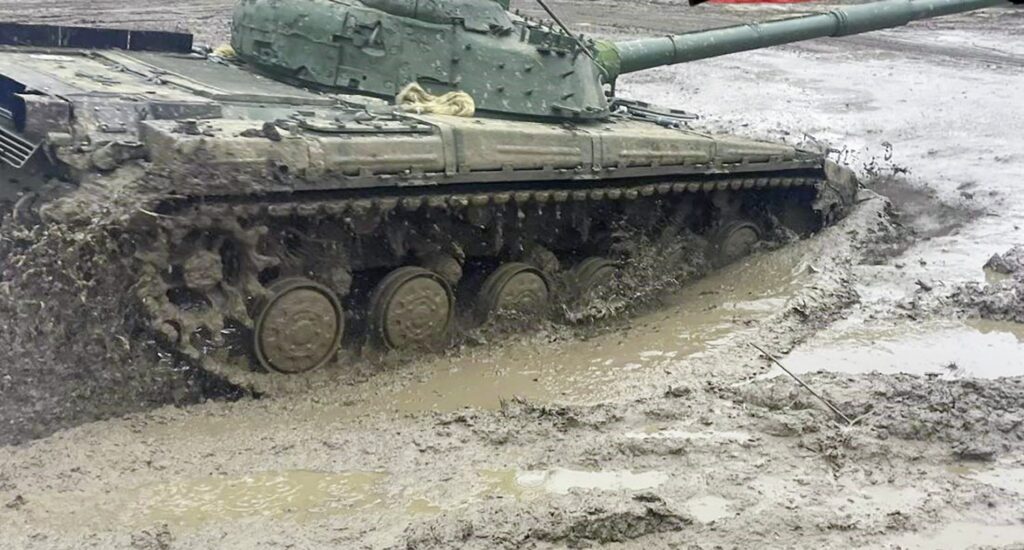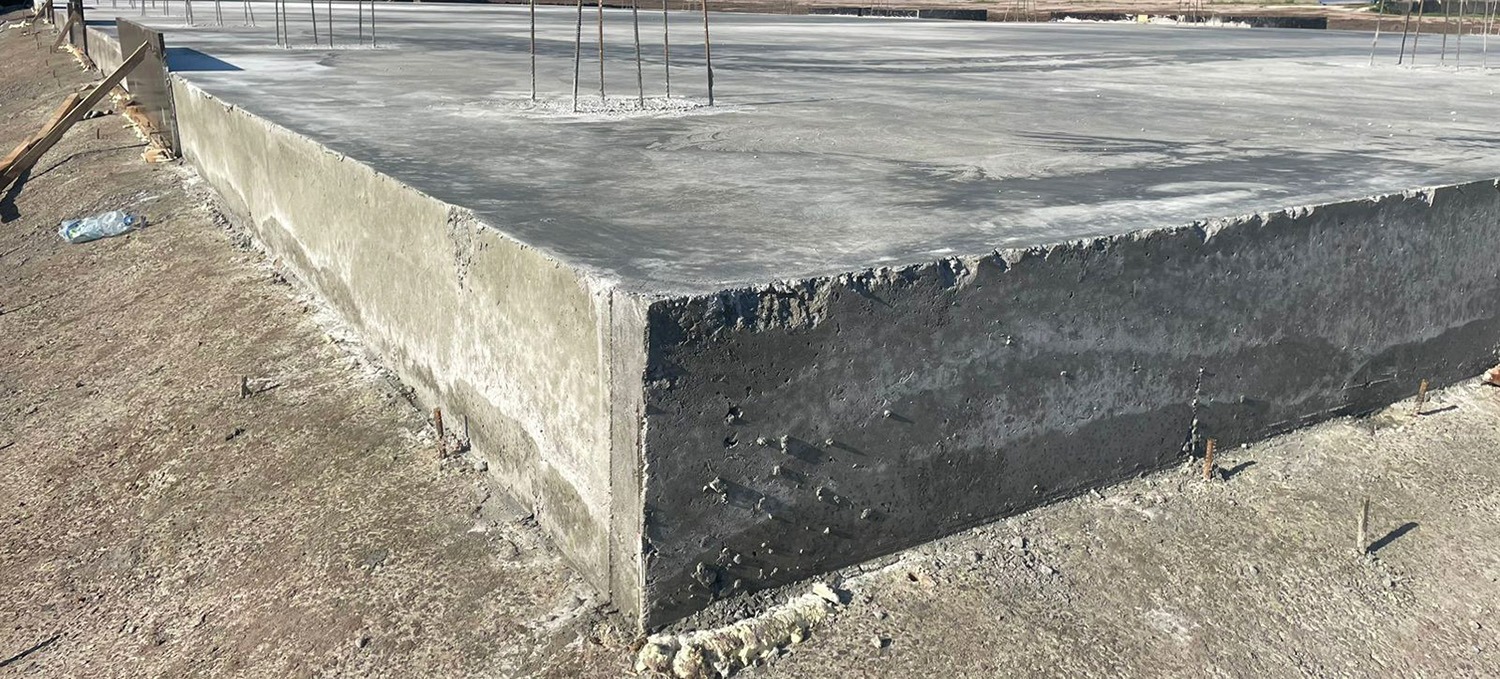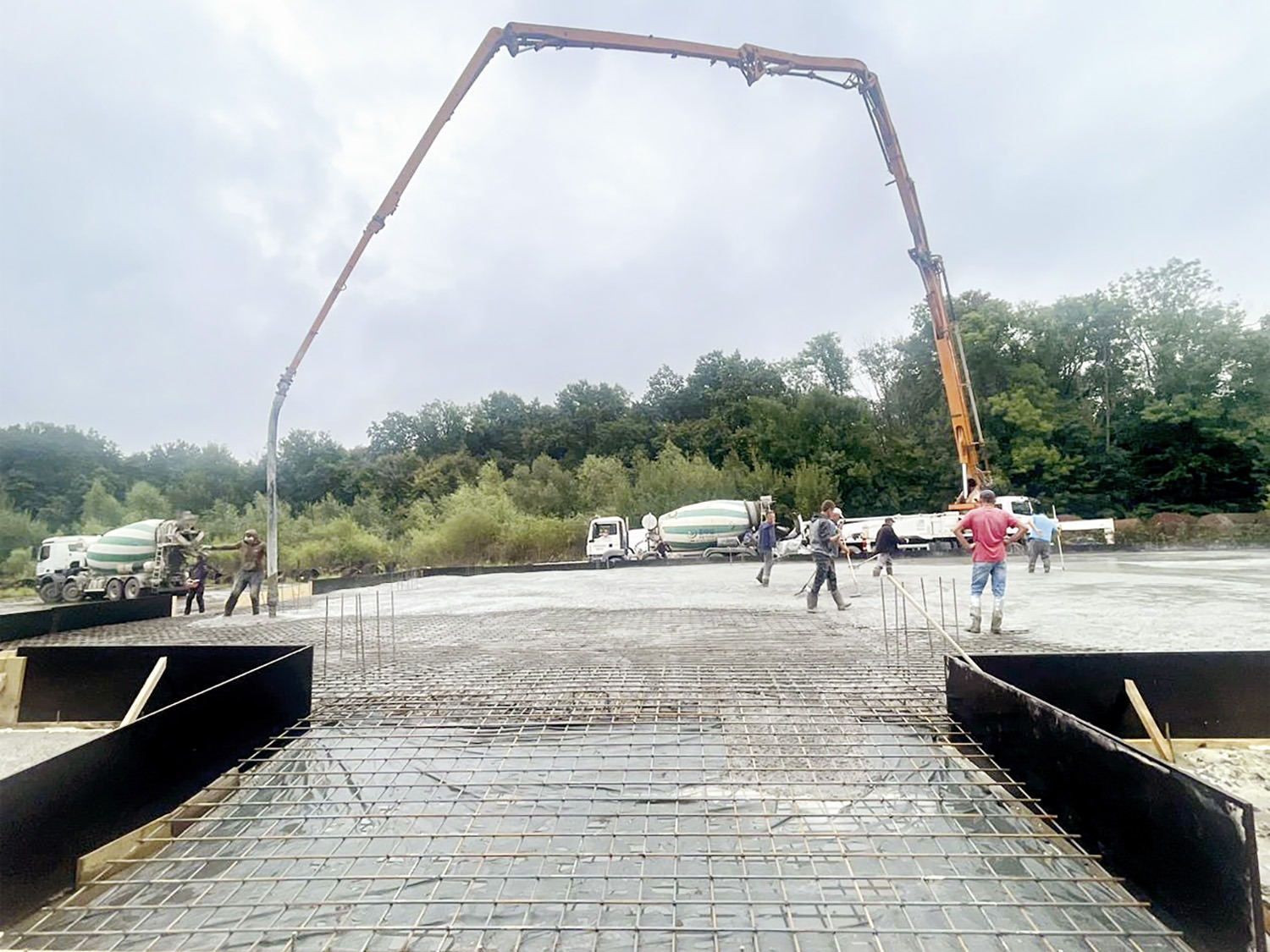
The invisible front
10. November 2025

21. August 2025
As part of their joint venture, Rheinmetall and the Ukrainian land systems industry are carrying out on-site repairs of military and combat vehicles. Ammunition production is also set to begin shortly, followed by the production of combat vehicles. The necessary infrastructure for this is being provided by Rheinmetall Project Solutions. The challenges are considerable, as is the responsibility – but a young professional is mastering this task with bravura.
Rheinmetall Ukrainian Defense Industry
Rheinmetall Ukrainian Defense Industry LLC was founded in Kiev as a joint venture between the Ukrainian state-owned company Ukrainian Defense Industry JSC (UDI, formerly Ukroboronprom) and Rheinmetall. The joint venture has been operative since October 2023. Rheinmetall Land Systems GmbH holds 51 percent of the shares, while UDI holds 49 percent. The aim is to strengthen the Ukraine’s defence industry and ultimately the country’s national security. The intention is to gradually build up joint capabilities in defence technology in the Ukraine.
Field of activity: Rheinmetall Ukrainian Defense Industry provides services in the areas of servicing and maintenance, assembly, production and development of military vehicles, initially exclusively within the territory of the Ukraine.
The first step in the cooperation between Rheinmetall and UDI is the repair of military vehicles that were provided to the Ukraine by the German government through ring-exchange projects and direct deliveries. The cooperation is also supposed to be extended to the joint production of individual Rheinmetall products in the Ukraine.
As part of their joint venture, Rheinmetall and the Ukrainian land systems industry are carrying out on-site repairs of military and combat vehicles. Ammunition production is also set to begin shortly, followed by the production of combat vehicles. The necessary infrastructure for this is being provided by Rheinmetall Project Solutions. The challenges are considerable, as is the responsibility – but a young professional is mastering this task with bravura.
The repair work of military vehicles has top priority in Ukraine. But no tank repairs without workshops and functioning infrastructure. Rheinmetall Project Solutions plays a key role in building exactly that. This Rheinmetall subsidiary has lean structures, is highly flexible, and fearless of taking on demanding assignments. The results so far: the first repair centre is already operating at full capacity, the second hall is nearing its completion, and further facilities are already in the planning phase.
One might expect that the task of successfully launching the production plant in war-torn Ukraine is a job for an “old hand”. After all, it requires extensive expertise, paired with a strong talent for improvisation and diplomatic skills. Yet the project manager entrusted with this challenging mission by Rheinmetall Project Solutions is just 29 years old. Simon H. (name changed by the editors) had only just completed his university studies in forestry when he applied to Rheinmetall Project Solutions (RPS) in 2022. His new employer immediately threw the “greenhorn” in at the deep end. “Yes”, proclaims the project manager with a laugh, “handing over a task like this to someone fresh out of university definitely involves a certain risk”. But, in the end, the decision in favour of Simon H. was absolutely perfect.
A hall built in 71 days
Rheinmetall Project Solutions is supplying the workshop facilities for Ukraine as part of Rheinmetall Ukrainian Defense Industry LLC (RhUDI). The joint venture agreement covers, on the one hand, the repair of military vehicles provided to Ukraine via the German government and through direct deliveries. On the other hand, the joint venture also comprises repairs and maintenance of other combat vehicles coming from the frontline. More than a thousand days after Russia’s attack, this support is urgently needed.
Construction of the maintenance hangars should therefore be as fast and as safe as possible. In addition to that, the question of the appropriate location also arose. Since there was previously no European presence in Ukraine, Rheinmetall Project Solutions initially set up a hub in the neighbouring EU country of Romania in close cooperation with the Rheinmetall Land Systems service centre and Rheinmetall Automecanica. “Within 71 days after the order was initially placed, we had successfully delivered,
erected, and handed over the hall”, says Simon H. He is still justifiably proud of this “speed record” to this day.

Nothing is impossible
Simon H. and his team didn’t have much time to rest on their laurels. Shortly afterwards, a decision was made to relocate the hub from Romania to Ukraine. Transporting military vehicles from Romania into Ukraine, being a non-EU state, proved to be a complex undertaking. The local authorities have their own regulations, and despite the ongoing war, the expected level of flexibility isn’t always given. “But after a few months, we were asked whether we could relocate the hub to Ukraine, including the full setup and installation”, the project manager recalls. Following the motto “nothing is impossible”, Simon H. and his team took a deep breath – and rose to the challenge.
But how to move the hall into Ukraine? Simon H. and his colleagues discussed various options. Many ideas were considered and ultimately rejected. In the end, the so-called green corridor at the Polish-Ukrainian border, which is used to haul NATO and EU aid deliveries into Ukraine, proved to be the only practical solution. “The modular design of our halls is a major advantage”, the project manager explains. “We can simply pack them into containers and transport them on flatbed trucks”. Thanks to this flexibility, the halls can be assembled even under difficult conditions and safely stored should the transport be interrupted.
“So, we completely dismantled the hall in Romania, loaded it, and took it to Poland,” says Simon H. From there, the Ukrainian military took over the rest of the transfer. The advantage of that: the transport route was secure. The downside: once handed over, there was no longer any way to track the shipment. “It took over a week for the first hall to arrive at its destination”, the project manager recalls.

The next level
Once all the trucks carrying the containers had arrived, the real work for Rheinmetall Project Solutions began. As soon as it was confirmed that the hub would be relocated directly into Ukraine, Simon H.’s team, in coordination with RhUDI, began preparing the construction site at the new location. “There was still rubble and remnants of an old building on the site”, he explains. “We took care of the clearing and then erected the new hall on that ground.” This repair hub has been in operation since 2024, but it wasn’t the only one. The order for hub number two arrived while the first workshop was still being built.
The site was literally in the middle of nowhere. “The area we were given was sloped and covered with mud.” Preparing the ground proved to be a particularly demanding task. “The rainy periods in autumn and spring in Ukraine are a real challenge”, explains Simon H. “Everything gets stuck in the mud. We had to make sure our hall was built on solid ground.” This required extensive groundwork. To create a stable foundation, the team first levelled and compacted the soil, then installed a concrete slab capable of supporting more than 60 tonnes.


“The infrastructure we are building has to be universally usable and suitable for all types of vehicles”, says the project manager. Whether it’s trucks, Marder infantry fighting vehicles, Leopard main battle tanks, or self-propelled howitzers with their massive turrets – all of these military utility and combat vehicles can be serviced and repaired in the halls by Ukrainian specialists. Rheinmetall Project Solutions also takes care of the supporting infrastructure, from electrical and fresh-water connections to office and medical containers.
25 years of operational experience
When the German Bundeswehr participated in the peacekeeping mission in Kosovo in 1999 as part of its KFOR mandate, Rheinmetall supported the German troops for the first time with its maintenance services. Since then, the portfolio and customer base of this business area have expanded continuously. Today, the subsidiary Rheinmetall Project Solutions, founded in 2021, offers its military partners a comprehensive range of practical services, even in dangerous deployment areas around the world. These include the provision of infrastructure for military camps and field hospitals, integrated logistics services, airfield support, field camp protection technologies, and the disposal of munition dumps, such as in the Baltic Sea.
The marder protects life
Project management also requires being present – which is not without risk in a war-torn country, even though everything is done to ensure the safety of the German cooperation partners. “I am regularly on-site every four to five weeks”, says Simon H. “Due to the security situation, we try to minimize our stays in Ukraine. However, for certain stages of construction, my presence is indispensable. I can’t manage a project without having seen the progress myself or spoken to the people working there. Having someone send me pictures of the site via WhatsApp is, of course, not possible for security reasons.” His first trip to Ukraine left an everlasting impression on the young project manager: “It was so surreal. You fly to Poland, and everything is fine. Then you pass the border, and it’s like being in a time warp. That’s when I truly understood what the EU can mean for Ukraine”.
By now, Simon H. has seen many of the vehicles that have come in from the frontline for repair. “When you look at the Marders that have been heavily damaged by drones and other attacks, it makes you feel uneasy. You think about the crew – but then, the crew compartment is intact!” He notes that German equipment is extremely valued by the soldiers, precisely because casualties are so rare. That’s why everything must be repaired as quickly as possible and returned into service. The motivation of the Ukrainian and German staff from RhUDI and Rheinmetall Land Systems on-site is “incredibly high”, says the project manager. “If work is necessary on a Saturday or Sunday – there is no discussion whatsoever.” Because they all know: every day, every hour without these urgently needed vehicles aggravates things for the troops on the frontline.
A marathon, not a sprint
And what about the Russian military? How is it possible, given the surveillance and reconnaissance capabilities of Putin’s forces today, to build halls of this scale without being detected? Especially when taking into consideration that the founding of RhUDI and its activities have been reported in Western media? “The halls are still standing”, says Simon H., and he hopes it will stay that way. “We keep our communication flows as limited as possible. And of course, Ukraine also has a strong interest in protecting these sites.”
In addition to further maintenance hubs, Rheinmetall Ukrainian Defense Industry is planning the infrastructure needed for the production of ammunition and combat vehicles. “It’s a marathon, not a sprint”, says Simon H. Even if the war would eventually come to an end, something everyone is hoping for, the work will be far from over. Rheinmetall was one of the first companies to stand firmly by Ukraine’s side following the Russian invasion and will, if called upon, continue to support the country in the future, both in reconstruction and in securing its borders.
That is why individuals like Simon H. are so important in their commitment and dedication. As a career changer and young professional, he found his dream job at Rheinmetall: “Finding an employer who places so much trust in you felt like winning the lottery”, says the project manager. “And it is incredibly rewarding to see a purpose in your work.” He recommends that young people looking for an interesting job simply drop in for a taster or send a speculative application. It doesn’t always have to be Ukraine. “There are so many opportunities within the Rheinmetall group!”
Click here to receive push notifications. By giving your consent, you will receive constantly information about new articles on the Dimensions website. This notification service can be canceled at any time in the browser settings or settings of your mobile device. Your consent also expressly extends to the transfer of data to third countries. Further information can be found in our data protection information under section 5.